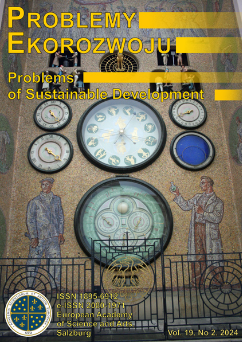Theoretical Foundations of Human Capital Education in Economic Growth and Development Management
Franciszek Piontek
WSB University in Dąbrowa Górnicza (Poland)
Barbara Piontek
WSB University in Dąbrowa Górnicza (Poland)
Abstract
In this paper we try to answer the following questions: How will the nature of science change? And How will the education of human capital change and what will it be like, as a result of changing the nature of science, in structural and functional terms and what consequences for the management of growth and development will it have? Change in the nature of science consists of negating the basic axiom, which is the principle of contradiction YES is not NO replacing it with paradigm of deregulation YES=NO=MAYBE. Modify in quality of the education of human capital, the restriction of general education; the limitation of competencies resulting from general education may have adverse effects in the demanding technology market and may eliminate advantages in the processes of automation and robotization. The most important conclusions from the discussion are that science and education are strategic categories and determine the quality of human capital and the nature of science and education in the strategic dimension cannot be determined solely by neither short-term market needs, nor by research teams that are narrowly specialized and guided by their own determinants and priorities, education in the strategic dimension cannot be managed according to the rules of crisis management, ad hoc and for market needs.
Keywords:
wisdom (Greek sophia), skill (Greek techne), education, human capital, management, the principle of contradiction, the code of civilization, the principle of deregulation, the Constitution of the World, paradigm, development, economic growthReferences
BIHR A., 2008, Nowomowa neoliberalna. Retoryka kapitalistycznego fetyszyzmu, Książka i Prasa, Warsaw.
Google Scholar
BOCHENEK K., 2010, Some of the Theoretical Sustainable Development Aspects in the Reflection of Christian Middle Ages Philosophy, in: Problemy Ekorozwoju/ Problems of Sustainable Development, 5(1), p. 71-79.
Google Scholar
LISBON GROUP, 1996, Granice konkurencji/The Borders of Competition, Poltex, Warsaw.
Google Scholar
KAKU M., String Theory, http://mkaku.org/home/tag/string-theory/ (12.11.2018).
Google Scholar
KOWALSKI M., 1959, Logika, Pallotinum, Poznań 1959.
Google Scholar
KUHN T.S., 1962, The Structure of Scientific Revolutions, University of Chicago Press, Chicago.
Google Scholar
KUNZMANN P., BURKARD F.P., WIEDMANN F., 1999, Atlas filozofii, Warszawa.
Google Scholar
MARTIN H.P., SCHUMANN H., 1998, The Global Trap: Globalization and the Assault on Prosperity and Democracy, Pluto Press.
Google Scholar
ORTEGA y GASSET J., 1932, The Revolt of the Masses, Norton.
Google Scholar
PAPUZIŃSKI A., 2013, The Axiology of Sustainable Development an Attempt at Typologization, in: Problemy Ekorozwoju/ Problems of Sustainable Development, 8(1), p. 5-25.
Google Scholar
PIONTEK B., PIONTEK F., 2017, Development from Theory to Practice, Shaker Verlag.
Google Scholar
PIONTEK F., PIONTEK B, 2016, . Teoria rozwoju, PWE, Warsaw, p. 60-65.
Google Scholar
ŚWIEŻAWSKI S., 2000, Dzieje europejskiej filozofii klasycznej, PWN, Warszawa, Wrocław, p. 404.
Google Scholar
TOFFLER A., TOFLER H., 1995, Creating a New Civilization: The Politics of the Third Wave, Turner Publishing.
Google Scholar
TOFFLER A., 1980, The Third Wave, Bantam Books.
Google Scholar
VATIMO G., PATERLINI P., 2010, Not Being God: a Collaborative Autobiography, Columbia University Press.
Google Scholar
Authors
Franciszek PiontekWSB University in Dąbrowa Górnicza Poland
Authors
Barbara PiontekWSB University in Dąbrowa Górnicza Poland
Statistics
Abstract views: 18PDF downloads: 8
License

This work is licensed under a Creative Commons Attribution-ShareAlike 4.0 International License.




